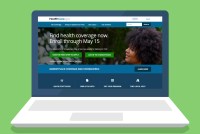Latest KFF Health News Stories
KFF Health News' 'What the Health?': LIVE From KFF: Health Care and the 2024 Election
The Affordable Care Act has not been a major issue in the 2024 campaign, but abortion and reproductive rights have been front and center. Those are just two of the dozens of health issues that could be profoundly affected by who is elected president and which party controls Congress in 2025. In this special live episode, Tamara Keith of NPR, Alice Miranda Ollstein of Politico, and Cynthia Cox and Ashley Kirzinger of KFF join KFF Health News chief Washington correspondent Julie Rovner to discuss how health policy has affected the campaign and how the election results might affect health policy. Plus, the panel answers questions from the live audience.
Oregon Senator Proposes Criminal Charges and Fines for Rogue Obamacare Agents
Oregon Sen. Ron Wyden introduced legislation intended to curb a growing problem in which consumers, without their consent, are enrolled in Affordable Care Act plans or their coverage is switched.
KFF Health News' 'What the Health?': For ACA Plans, It’s Time to Shop Around
It’s Obamacare open enrollment season, which means that, for people who rely on these plans for coverage, it’s time to shop around. With enhanced premium subsidies and cost-sharing assistance, consumers may find savings by switching plans. It is especially important for people who lost their coverage because of the Medicaid unwinding to investigate their options. Many qualify for assistance. Meanwhile, the countdown to Election Day is on, and Ohio’s State Issue 1 is grabbing headlines. The closely watched ballot initiative has become a testing ground for abortion-related messaging, which has been rife with misinformation. This week’s panelists are Mary Agnes Carey of KFF Health News, Jessie Hellmann of CQ Roll Call, Joanne Kenen of the Johns Hopkins Bloomberg School of Public Health and Politico, and Rachana Pradhan of KFF Health News.
KHN’s ‘What the Health?’: Washington’s Slow Churn
Stemming gun violence is back on the legislative agenda following three mass shootings in less than a month, but it’s hard to predict success when so many previous efforts have failed. Meanwhile, lawmakers must soon decide if they will extend current premium subsidies for those buying health insurance under the Affordable Care Act, and the Biden administration acts, belatedly, on Medicare premiums. Margot Sanger-Katz of the New York Times, Sandhya Raman of CQ Roll Call, and Rachel Cohrs of Stat News join KHN’s Julie Rovner to discuss these issues and more. Also this week, Rovner interviews KHN’s Michelle Andrews, who reported and wrote the latest KHN-NPR “Bill of the Month” episode about a too-common problem: denial of no-cost preventive care for a colonoscopy under the Affordable Care Act.
KHN’s ‘What the Health?’: Here Comes Reconciliation
Democrats in Congress reached a tentative agreement to press ahead on a partisan bill that would dramatically expand health benefits for people on Medicare, those who buy their own insurance and individuals who have been shut out of coverage in states that didn’t expand Medicaid. Meanwhile, controversy continues to rage over whether vaccinated Americans will need a booster to protect against covid-19 variants, and who will pay for a new drug to treat Alzheimer’s disease. Rachel Cohrs of Stat and Sarah Karlin-Smith of the Pink Sheet join KHN’s Julie Rovner to discuss these issues and more. Also, Rovner interviews KHN’s Rae Ellen Bichell, who reported and wrote the latest KHN-NPR “Bill of the Month” episode about a mother and daughter who fought an enormous emergency room bill.
KHN’s ‘What the Health?’: The ACA Lives
In a surprisingly strong 7-2 decision, the Supreme Court turned back the latest constitutional challenge to the Affordable Care Act, likely heralding the end of GOP efforts to strike the law in its entirety through court action. Meanwhile, Democratic lawmakers are looking for ways to expand health benefits. Joanne Kenen of Politico, Mary Ellen McIntire of CQ Roll Call and Rachel Cohrs of Stat join KHN’s Julie Rovner to discuss these issues and more. Also, Rovner interviews Andy Slavitt, who recently stepped down from the Biden administration’s covid response team, about his new book on the pandemic.
KHN’s ‘What the Health?’: Getting Down to Work at HHS
After a bruising confirmation process, Xavier Becerra was sworn in as secretary of Health and Human Services this week. The Senate also confirmed the nominations of former U.S. Surgeon General Vivek Murthy to return to the post he held in the Obama administration, and former Pennsylvania health secretary Rachel Levine as assistant secretary for health. Levine is the first openly transgender person to receive Senate confirmation. Meanwhile, questions continue to swirl around the AstraZeneca covid vaccine, which some public health experts worry will create more hesitancy toward other vaccines.
Lots of Health Insurance Help in Covid Relief Law — But Do Your Homework First
Democrats’ $1.9 trillion covid relief package will offer some of the most significant help for Americans to pay for health insurance in a decade. But the temporary provisions are complicated. KHN offers tips for consumers.
Were You Notified About Missing Tax Forms for Your ACA Subsidy? Blame COVID.
Some consumers who received tax credits to purchase insurance from Affordable Care Act marketplaces report they’ve received letters in error from the government saying they didn’t file the IRS forms to account for how much money they made and how much funding they received from the government.
Feds Slow Down But Don’t Stop Georgia’s Contentious Effort To Ditch ACA Marketplace
The state proposes to jettison the federal insurance exchange and instead send people buying individual coverage to private companies to choose coverage. It would also cap how much money is spent on premium subsidies, which could mean some consumers would be put on a wait list if they needed financial help buying a plan.
California To Provide Financial Boost To Help Buy Health Coverage
Come Jan. 1, California will be the first state to offer financial aid to middle-class people who make too much money to qualify for federal Obamacare tax credits. And Californians will once again owe a penalty if they are uninsured.
California ayudará a la clase media a comprar cobertura de salud
Muchas personas de clase media han tenido dificultades para pagar un seguro de salud, asumiendo el costo total de las primas que pueden superar los $1,000 al mes.
KHN’s ‘What The Health?’: Despite Booming Economy, Uninsured Rate Ticks Up
Nearly 2 million more Americans were uninsured in 2018 than in the previous year, according to the Census Bureau’s annual report. Plus, the Trump administration announced plans to ban flavored vape liquids, and Congress is back and working to address high prescription drug prices and “surprise” medical bills. This week, Joanne Kenen of Politico, Tami Luhby of CNN and Rebecca Adams of CQ Roll Call join KHN’s Julie Rovner to discuss these issues and more.
‘If You Like Your Plan, You Can Keep It.’ Biden’s Invokes Obama’s Troubled Claim.
The health policy landscape is very different than it was when Barack Obama made this pledge as part of his pitch for the Affordable Care Act. But the words still might be risky for Democratic presidential primary hopeful Joe Biden.
Must-Reads Of The Week From Brianna Labuskes
Newsletter editor Brianna Labuskes wades through hundreds of health care policy stories each week, so you don’t have to.
Must-Reads Of The Week From Brianna Labuskes
Newsletter editor Brianna Labuskes wades through hundreds of health care policy stories each week, so you don’t have to.
California Gov. Newsom Proposes Penalty To Fund Health Insurance Subsidies
Gov. Gavin Newsom wants to help an estimated 850,000 Californians pay their health insurance premiums and would fund his plan with a tax penalty on people who don’t have coverage. If he succeeds, California would be the first state to subsidize middle-income people who make too much to qualify for federal financial aid.
Podcast: KHN’s ‘What The Health?’ Health Care’s Back (In Court)
It’s been a wild week for health policy, mostly because of developments surrounding two different legal cases. Margot Sanger-Katz of The New York Times, Joanne Kenen of Politico and Kimberly Leonard of the Washington Examiner join KHN’s Julie Rovner to sort it out with a discussion of a setback for Medicaid work requirements and the Trump administration’s decision to back a lawsuit claiming the entire Affordable Care Act is unconstitutional. Also, Rovner interviews filmmaker Mike Eisenberg about his movie “To Err Is Human: A Patient Safety Documentary.”
Podcast: KHN’s ‘What The Health?’ How Safe Are Your Supplements?
Alice Ollstein of Politico, Kimberly Leonard of the Washington Examiner and Anna Edney of Bloomberg News join KHN’s Julie Rovner to discuss the latest national health spending estimates, another FDA crackdown on dietary supplements and lawsuits between insurers and the federal government that could result in a windfall for consumers.
Must-Reads Of The Week From Brianna Labuskes
Newsletter editor Brianna Labuskes wades through hundreds of health articles from the week so you don’t have to.

















